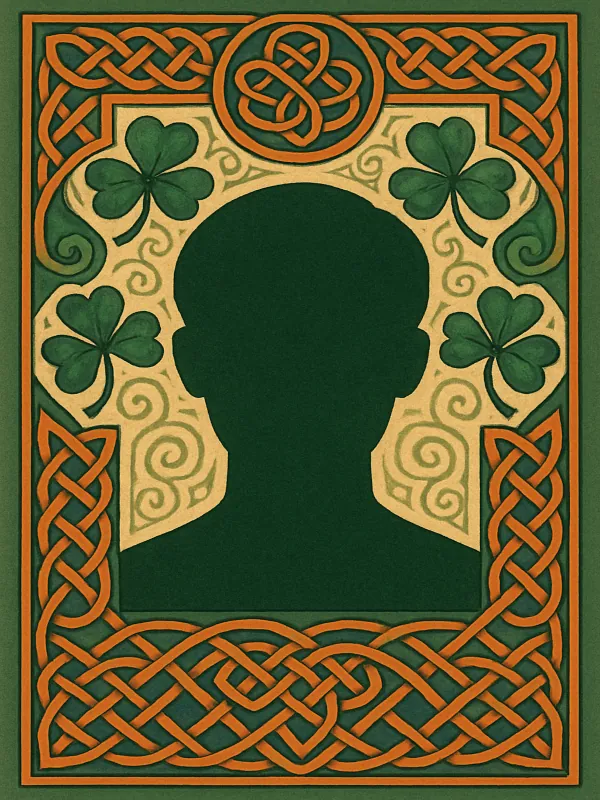Aodh Mac Gabhráin
Biography

Aodh Mac Gabhráin – anglicized Hugh MacGauran – was a Gaelic Irish poet active in the early 18th century. Irish biographical sources record that he was born about 1670 in Gleann Ghaibhle (Glangevlin) in County Cavan. He later moved in learned circles; in Dublin he belonged to the literary circle of the scholar-poet Tadhg Ó Neachtáin. Though only a few of Mac Gabhráin’s poems survive, scholars regard him as having “an important place in 18th-century Irish-language poetry”. His best-known work is Pléarácha na Ruarcach (rendered in English as O’Rourke’s Feast or Description of an Irish Feast), a comic celebration of an O’Rourke chieftain’s riotous Christmas banquet.
Mac Gabhráin is sometimes referred to as Mac Shamhrain or Mac Shamhadhrain, anglicised MacGauran or MacGovern.
Historical Context
Mac Gabhráin lived through the turbulent aftermath of the Williamite (Jacobite) Wars in Ireland (1689–1691). The defeat of the Irish Jacobites in 1691 shattered the old Gaelic order and dispossessed much of the Catholic gentry. In this climate, the Irish language and its bardic traditions were no longer backed by powerful patrons, but survived among rural communities and a dwindling class of scribes. As the Encyclopædia Britannica observes, the everyday life of rural Irish Catholics in the 18th century “can be glimpsed only from… Gaelic poetry”. Mac Gabhráin’s career falls in this era of cultural transition: although he wrote in a Gaelic milieu now overshadowed by English rule, he retained the old style of bardic verse, even as it began to be collected and printed in song anthologies. His connection to Ó Neachtáin’s Dublin circle reflects how a few learned men strove to preserve Irish literary culture under the new Ascendancy.
Major Works
Pléarácha na Ruarcach (O’Rourke’s Feast): By far Mac Gabhráin’s most celebrated poem, Pléarácha na Ruarcach describes the uproarious revelry at a Gaelic lord’s Christmas feast in Dromahair, Co. Leitrim. Its verse relays scenes of feasting and drinking (with “seven score hogs… seven fat oxen and sheep for the feast” and “hundreds of pails of whiskey” served on each day), wild dancing, and shameless impertinence. The blind harper Turlough Ó Cearbhalláin (Turlough Carolan) famously set Mac Gabhráin’s words to music – indeed this is the only known case of Carolan composing a tune for a contemporary poet’s lyrics. (The poem’s tune was later printed by John & William Neal in 1724 under the title “Plearaca no Ruarcach”.) Pléarácha became widely known outside Ireland: Jonathan Swift admired the bawdy poem and produced an English version titled “The Description of an Irish Feast” around 1720 (Swift’s text was not published until 1735).
Achasán an Mharcaigh (The Horserider’s Reproach): Another poem traditionally attributed to Mac Gabhráin is Achasán an Mharcaigh, a humorous complaint by a cavalier who has just been thrown from his horse. The rider vents a stream of inventive insults at the beast – for example, the poem famously opens with “Is buan in do thóin mo mhallacht” (“My curse on your buttocks forever”). This lively, satirical verse appears in modern anthologies of Gaelic verse (with English translation) and is listed explicitly under Mac Gabhráin’s name in 20th-century song collections. The tone of Achasán is typical of Mac Gabhráin’s playful style; as one 19th-century source observed, he “excelled particularly in the ludicrous species of poetry”.
Modern compilations of Irish-language song and poetry confirm these attributions: both Pléarácha na Ruarcach and Achasán an Mharcaigh appear (with musical settings) in scholarly collections such as An Duanaire 1600–1900 and the Nua-dhuanaire songbooks. Manuscript evidence also preserves Plearacha: for example, an early-18th-century Gaelic commonplace book (Patrick Turner’s MS) contains “Plearacach na Ruarcach” in full. Mac Gabhráin’s name appears in scribal anthologies, too – a Cambridge University Library manuscript of “Ulster poems” (c.1830s) lists pléaráca and other pieces under his name.
Style and Legacy
Mac Gabhráin wrote in the classical Irish metrical tradition, with a flair for vivid narrative and satire. His surviving poems show a comic, almost parodic tone: they make merry of Gaelic aristocratic life and foibles. Even though he wrote at a time when Irish-language culture was under pressure, his verse helped keep traditional lore alive. In the 18th century Irish song tradition, Pléarácha na Ruarcach became widely sung and adapted; its tune (through Carolan’s composition) has remained part of the repertoire of traditional Irish musicians.
Today Mac Gabhráin is remembered in Irish literary history as one of the notable Gaelic poets of the post-Jacobite era. He is included in modern Irish biographical dictionaries and encyclopedias (e.g. the Dictionary of Ulster Biography) as an exemplar of the northern bardic tradition. His poems continue to be studied as colorful examples of 18th-century Irish verse. As scholars note, even though only a few of his works survive, “little of his work has come down to us, but he occupies an important place in 18th-century Irish-language poetry”.
Works
Poems
- Achasán an Mharcaigh (The Horserider’s Reproach)
- Pléarácha na Ruarcach (O’Rourke’s Feast) (1712)
References
- An duanaire 1600-1900 : Poems of the dispossessed / curtha I láthair AG Seán Ó Tuama ; with translations into English verse by Thomas Kinsella. Irish Traditional Music Archive. (n.d.). https://itmacatalogues.ie/Portal/Default/en-GB/RecordView/Index/100286
- Aodh Mac Gabhráin. (2024, May 18). In Wikipedia. https://ga.wikipedia.org/wiki/Aodh_Mac_Gabhr%C3%A1in
- Aodh Mac Gabhrain. (2024, November 6). In Wikipedia. https://it.wikipedia.org/wiki/Aodh_Mac_Gabhrain
- Commonplace book of Patrick Turner containing “bolg an T-sholair” and other miscellaneous verse in Gaelic. National Library of Scotland Archives and Manuscript Catalogue. (n.d.). https://manuscripts.nls.uk/repositories/2/resources/20192
- O’Rourkes Feast 1580’s. Dromahair Heritage. (2018, May 21). https://dromahairheritage.wordpress.com/orourkes-feast-1580s/
- Ó Séaghdha, D. (2019, June 28). The Irish for: If you can’t say anything nice about someone, Tar Isteach. TheJournal.ie. https://www.thejournal.ie/readme/the-irish-for-irish-insults-4701183-Jun2019/
- Plea Rarkeh na Rourkough or Ye Irish wedding. Irish song project – types & histories. (n.d.). https://irishsongproject.qub.ac.uk/song/98
- Ranelagh, J. O., & Edwards, R. W. D. (2025, May 28). The Restoration period and the Jacobite war. Encyclopædia Britannica. https://www.britannica.com/place/Ireland/The-Restoration-period-and-the-Jacobite-war
- Ulster History Circle. (n.d.). Aodh Mac Gabhrain. The Dictionary of Ulster Biography. https://www.newulsterbiography.co.uk/index.php/home/viewPerson/991
- Ulster Poems. University of Cambridge ArchiveSearch. (n.d.). https://archivesearch.lib.cam.ac.uk/repositories/2/resources/4390
